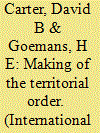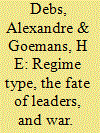|
|
|
Sort Order |
|
|
|
Items / Page
|
|
|
|
|
|
|
| Srl | Item |
| 1 |
ID:
103890


|
|
|
|
|
| Publication |
2011.
|
| Summary/Abstract |
We argue that new international borders are rarely new. We propose that when states choose new borders they use previous administrative frontiers to solve a difficult short-term bargaining problem and a long-term coordination problem. With a unique new set of data collected specifically for this project, we systematically examine the new international borders of the twentieth century resulting from secession, partition, and the use of force. New international borders, we find, are drawn not according to principles of "nationalism" or defensible borders, but rather according to previous administrative frontiers. How borders are drawn has important consequences for international stability: borders drawn along previously existing internal or external administrative frontiers experience fewer future territorial disputes and have a much lower risk of militarized confrontation if a dispute emerges.
|
|
|
|
|
|
|
|
|
|
|
|
|
|
|
|
| 2 |
ID:
100764


|
|
|
|
|
| Publication |
2010.
|
| Summary/Abstract |
We propose and test a formal model of war and domestic politics, building on recent evidence on the relationship between regime type, the effect of war on the probability of losing office, and the consequences of losing office. The less the outcome of international interaction affects a leader's tenure and the less punitive are the consequences of losing office, the more a leader is willing to make concessions to strike a peaceful bargain. We demonstrate that our theory successfully predicts war involvement among nondemocratic regime types. Moreover, our theory offers an intuitive explanation for the democratic peace. Compared to nondemocratic leaders, the tenure of democratic leaders depends relatively little on the war outcome, and democratic leaders fare relatively well after losing office. Thus, democratic leaders should be more willing and able to avoid war, especially with other democrats.
|
|
|
|
|
|
|
|
|
|
|
|
|
|
|
|
| 3 |
ID:
084025


|
|
|
|
|
| Publication |
2008.
|
| Summary/Abstract |
Most of the burgeoning theoretical and empirical literature on the role of leaders in comparative politics and international relations is built on the assumption that leaders choose policies to stay in office. However, leaders can lose office in a variety of ways. Leaders can lose office as a result of ill health; they can lose office in a regular manner; or they can be removed in an irregular manner such as by a coup. How a leader loses office, moreover, significantly affects the leader's subsequent fate. A broader perspective on not just the probability, but also the manner of losing office-and its associated consequences-thus suggests an additional mechanism to explain the behavior of leaders. If policy significantly affects not just whether, but also how, leaders lose office, leaders might design policy to minimize the anticipated negative consequences of losing office. Once we unpack the manner in which leaders lose office, for example, we see that the postulated logic of diversionary war only holds for a subgroup of leaders: those who fear an irregular removal from office.
|
|
|
|
|
|
|
|
|
|
|
|
|
|
|
|
|
|
|
|
|